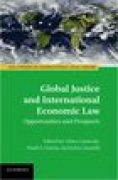
Global justice and international economic law: opportunities and prospects
Carmody, Chi
Garcia, Frank J.
Linarelli, John
This book takes a multidisciplinary approach to understanding the economic fairness problems that societies face as they become increasingly interdependent. This book takes a multidisciplinary approach to understanding the economicfairness problems that societies face as they become increasingly interdependent, and the solutions that international economic law and institutions might facilitate. It takes on the problems of understanding international economic law from the standpoints of rights and justice, in particular from the standpoint of distributive justice. This book takes a multidisciplinary approach to understanding the economic fairness problems that societies face as they become increasingly interdependent, and the solutions that international economic lawand institutions might facilitate. It takes on the problems of understanding international economic law from the standpoints of rights and justice, in particular from the standpoint of distributive justice. Since the beginnings of the GATT and the Bretton Woods institutions, and on to the creation of the WTO, states have continued to develop institutions and legal infrastructure to promote global interdependence. International lawyers are experts in understandinghow these institutions operate in practice, but they tend to uncritically accept comparative advantage as the principal normative criterion to justify these institutions. In contrast, moral and political philosophers have developed accounts of global justice, but these accounts have had relatively little influence on international legal scholarship and on institutional design. This volume reflects the results of a symposium held at Tillar House, the American Society of International Law headquarters in Washington, DC, in November 2008, which brought together philosophers, legal scholars and economists to discuss theproblems of understanding international economic law from the standpoints of rights and justice, in particular from the standpoint of distributive justice. INDICE: Part I. Theorizing Justice in International Economic Institutions:1. Approaching global justice through human rights: elements of theory and practice Carol C. Gould; 2. Global equality of opportunity as an institutional standard of distributive justice Daniel Butt; 3. Human persons, human rights, and the distributive structure of global justice Robert C. Hockett; 4. Global economic fairness: internal principles Aaron James; Part II. How Justice Gets Done in International Economic Institutions: 5. The conventional morality of trade Chin Leng Lim; 6. The political geography of distributive justice Jeffrey L. Dunoff; 7. Democratic governance, distributive justice and development Chantal Thomas; Part III. Skepticism About the Role of Justice in International Economic Institutions: 8. Global justice and trade Fernando Tesón and Jonathan Klick; 9. Jam tomorrow: a critique of international economic law Barbara Stark; 10. Doing justice: the economics and politics of international distributive justice Joel P. Trachtman.
- ISBN: 978-1-107-01328-5
- Editorial: Cambridge University
- Encuadernacion: Cartoné
- Páginas: 320
- Fecha Publicación: 09/01/2012
- Nº Volúmenes: 1
- Idioma: Inglés
